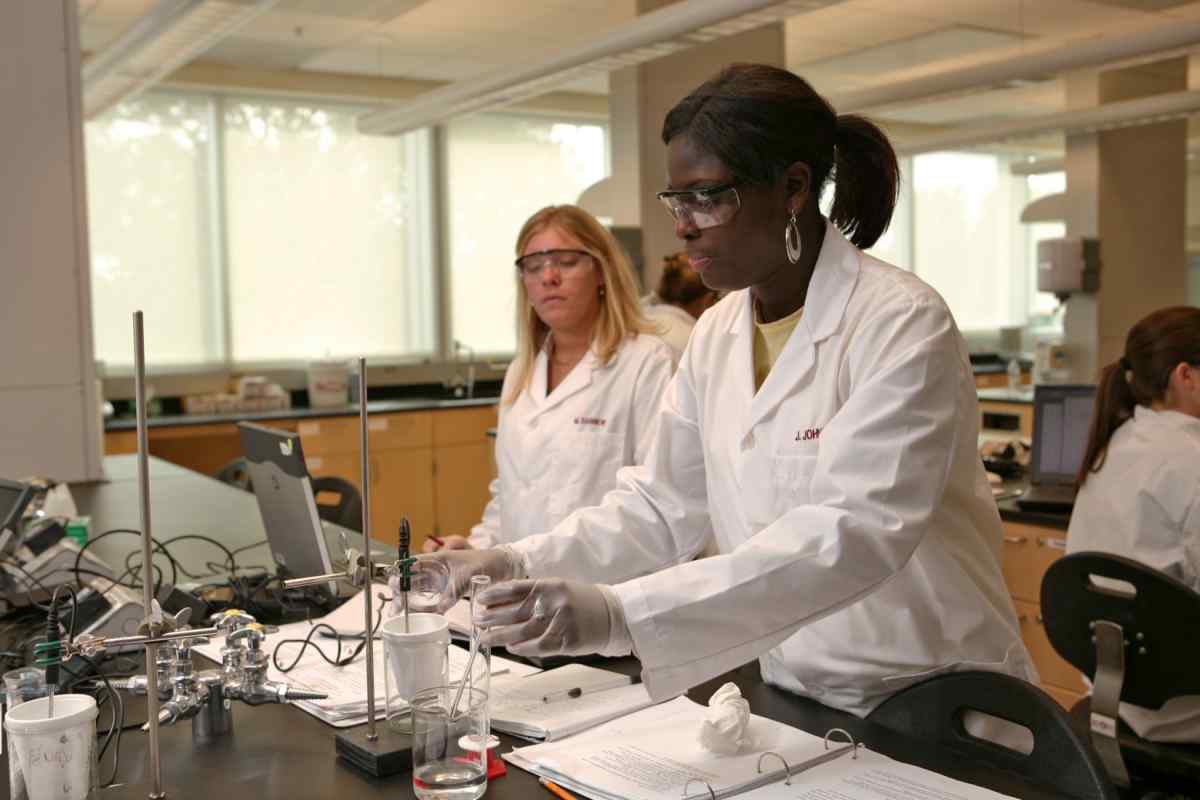

Research and Internship Opportunities
Faculty Research Areas
The Chemistry Department faculty run vibrant research programs that encompass all of the sub-disciplines of chemistry. Undergraduate students are an integral part of each faculty member's research program. Student-faculty research occurs both during the academic year in the Senior Capstone Experience and during the summer.
Environmental Chemistry
Dr. Leslie Sherman is an environmental chemist whose primary research focus is the impact of land use on water quality and soil health. For over 15 years, she has been investigating soil chemical changes at a long-term grassland restoration site developed on low-production agricultural land at the College’s River and Field Campus. The primary management practice is prescribed burning every 2 to 3 years. She is monitoring soil organic matter, pH, extractable metals, and cation exchange capacity, all indicators of soil health. Dr. Sherman is also studying phosphorus cycling in nearby Urieville Lake, which suffers from extreme summer algal blooms. Her primary focus is the sediments of the lake, which can bind phosphorus released into the lake from farm runoff, but which can release the phosphorus back into the lake under changing redox conditions and in response to physical disturbance.
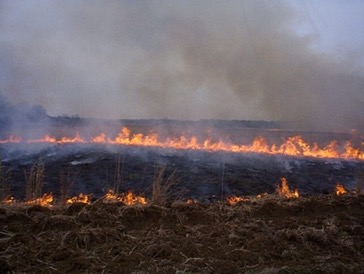
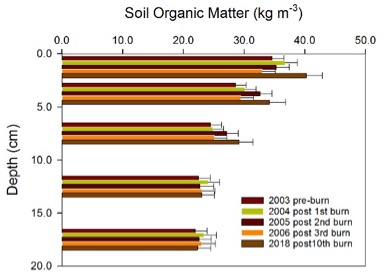
Inorganic Chemistry, Green Chemistry, and Materials Science
Dr. Marteel-Parrish’s research is focused on making green chemistry an essential component of chemical education. Research projects are based on curricular innovations such as:
- Using green chemistry as the driving force to investigate the periodic table and to infuse art in the chemistry curriculum,
- Addressing 21st century challenges including the United Nations Sustainable Development Goals and contemporary moral issues in the world, and
- Involving students in a service learning component by designing green chemistry based experiments adapted to the high school science curriculum.
The overall goal is to use green chemistry to build a web of interconnectedness within curricular and extra-curricular activities offered at Washington College so that students portray themselves as benefactors to the society.
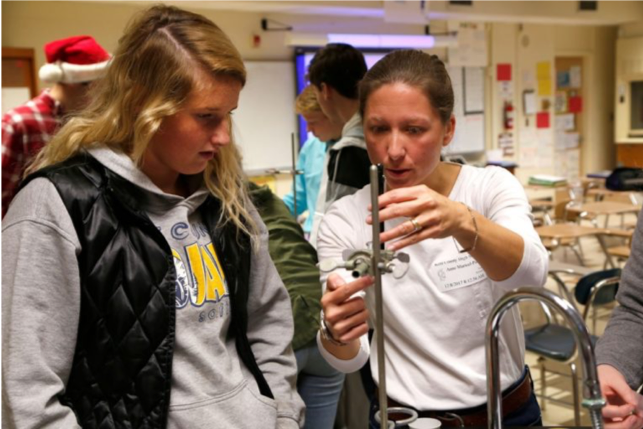
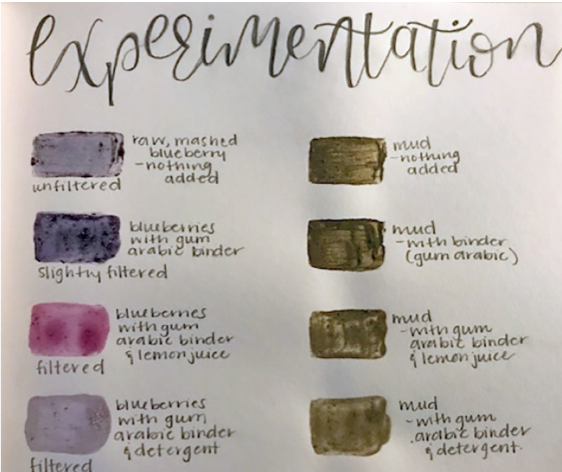
Physical and Computational Chemistry
In the Arradondo Lab, we investigate non-covalent interactions with computational modeling. The proper modeling of these interactions is important because they contribute to many areas, including atmospheric chemistry, solvation effects, and material science. Quantum chemical modeling is a powerful tool that can be utilized to predict complexation, thermochemistry, spectra, and other properties of various molecular systems. One application of interest that our lab seeks to purse is using computational chemistry to assist in the application of different green chemistry principles within popular chemical processes. We are also interested in collaborations with all other scientists in order to assist with molecular level insight into their research.
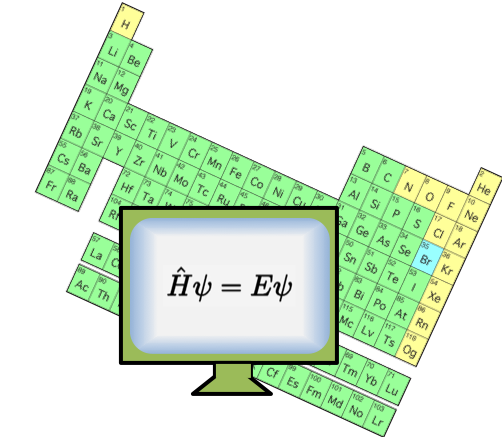
Organic Chemistry
The Bard lab focuses on the synthesis and characterization of a variety of novel organic small molecules. Through a combination of organic synthesis, analytical measurement, and physical organic concepts, we work to develop structure-property relationships for families of related molecules. Primarily, we are focusing on developing new and interesting types of Fluorescence Resonance Energy Transfer (FRET) dyes that seek to achieve high separations between the colors of light emitted and the colors of light absorbed. Additionally, we are working to develop a family of related ion-pair host molecules capable of selective sensing of certain ion pairs.
Natural Produce Chemistry, Chemical Ecology, and Biological Chemistry
Dr. Daniel May is a natural product chemist who studies the chemical structures, biological activities, and functions of small molecules (natural products) produced by microbes. Humans have long used these natural products as pharmaceuticals and pesticides without knowing the roles that they play in their native environments. The May lab studies natural products made by bacteria associated with bee hives and native bee nests. Student researchers in the May Lab use chemical and biological techniques to discover natural products from hive-associated bacteria, which could be used to treat brood diseases in honey bees. This research will help to improve the health of essential pollinators and to conserve our native bee species.
Senior Capstone Experience
All senior chemistry majors work in collaboration to complete a year-long laboratory or literature-based project. Students who elect to complete a laboratory-based SCE will undertake projects that involve synthetic and preparative procedures and include the use of the department’s research-grade Inert-Atmosphere Glove Box, UV-VIS, FTIR, AA, NMR, GC, HPLC, LC-MS, GC-MS, ICP-MS, electrochemical analyzer, and polarimeter.
Students pursuing the ACS-certified degree in Chemistry must perform a laboratory-based research project for their SCE to meet the number of laboratory hours required by the ACS. This requirement could be waived if ACS-certified majors have already performed research for credit during the academic year or during the summer.
Seniors present the results of their project in a poster session that is open to the College community. The department has a set of Senior Capstone Experience Guidelines that are distributed to both junior and senior chemistry majors each fall. For those students meeting the College-wide standards of eligibility for departmental honors at graduation, the capstone experience also forms the basis of an oral examination given at the end of the student’s final semester.
Students must enroll in CHE SCE in their final semester to obtain credit for the Senior Capstone Experience. The Senior Capstone Experience is graded according to the Washington College grading system, which involves the use of letter grades (A-F) that may be modified by a minus or a plus.
Recent SCE Projects
Erin Asman (adviser: Prof. James Lipchock)
“Review of Osteoarthritis in Equines and the Treatments Available” (literature review)
Felicia Attor (adviser: Prof. Anna Smith)
“Synthesis of flavonoids for anti-aging research” (experimental)
Eleanor Byers (adviser: Prof. Anne Marteel-Parrish)
“Biomimetic Preen Oil from Waste Cooking Oil: A Green Chemistry Laboratory for Secondary Students” (experimental)
Sean Garin (adviser: Prof. James Lipchock)
“Examining the Structural Requirements for Dot1 Mediated Senescence” (experimental)
Daniel Gonzalez (adviser: Prof. Aaron Amick)
“Synthesis of a Novel Acenaphthylene Semiconducting Polymer” (experimental)
Alexandra Hegeman (adviser: Prof. Anna Smith)
“The Significance of NUP170 in Delayed Cellular Senescence of Saccharomyces cerevisiae” (experimental)
Autumn Hoffman (adviser: Prof. Aaron Amick)
“Synthesis of 5-bromobenzo[c]phenanthrene, an Intermediate of the Missing Fullerene C72” (experimental)
Corbin Hudson (adviser: Prof. Sarah Arradondo)
“Ionic Liquids: the Designer Solvent” (experimental)
Jessica Melson (adviser: Prof. Anne Marteel-Parrish)
“The Effects of Microplastics on Water and Soil Samples Around the Chester River” (experimental)
Larisa Okshewsky (adviser: Prof. Anna Smith)
“Treatments and Preventions for Clostridium difficile” (experimental)
Savannah Ross (adviser: Prof. Aaron Amick)
“The Synthesis of Fullerene Derivatives to Create Potential Drugs to Alleviate Ischemic Stroke” (literature review)
Alexandra Searles (adviser: Prof. Leslie Sherman)
“Comparison of Phosphate Levels in Water Samples of Impaired Creeks off of the Chester River and Evaluation of Surrounding Land” (experimental)
Melissa Whittington (adviser: Prof. Sarah Arradondo)
“Characterizing small water clusters with ab initio Methods and Terahertz Spectroscopy” (experimental)
Tyler Buchanan (adviser: Prof. Rick Locker)
“Identification of Intermediate from Horseradish Peroxidase-Catalyzed Oxidation of o-Phenylenediamine using UV-vis and Fluorescence Spectroscopy” (experimental)
Valerie Fischer (adviser: Prof. James Lipchock)
“A Review of Current Field Analysis Methods for Testing Suspected Cannabinoid Use in Drivers” (literature review)
Dominic Giandonato (adviser: Prof. Aaron Amick)
“The Mechanistic Study Into a Base Induced Inhibition of Rings Closures within Polycyclic Aromatic Hydrocarbons” (experimental)
Edgardo Hernandez (adviser: Prof. Rick Locker)
“Determining Compound pH using a Smart Phone” (experimental)
Parakram Karki (adviser: Prof. James Lipchock)
“Mechanistic study of protein histidine phosphatase 1 and the effects of the elongation of the C-terminus on protein function and dynamics” (experimental)
Beatrice Keller (adviser: Prof. Anne Marteel-Parrish)
“A Cross-disciplinary Study Between Green Chemistry and Public Health: Comparative Analysis of Cooking Fuels and Cooking Methods on Food Composition and its Effect on Health in Rural China” (experimental)
Meredith Kenton (adviser: Prof. Anne Marteel-Parrish)
“Introducing Green Chemistry Principles into an Undergraduate Inorganic Chemistry Course” (experimental)
Jessie Nguyen (adviser: Prof. Anna Smith)
“Synthesis of Flavonoids for Anti-aging Research” (experimental)
Collin Vincent (adviser: Prof. Aaron Amick)
“Efficient Synthesis of New Aromatic Structural Scaffolds” (experimental)
Research Internships and Fellowships
Internships and research experiences on and off-campus not only provide invaluable laboratory experience, but also allow students to apply knowledge learned in the classroom, explore advanced areas of chemistry not covered in the core curriculum and experience the excitement and challenges of scientific discovery. In addition to valuable career preparation, students may receive a stipend and/or academic credit, depending on the internship or research opportunity.
Washington College students majoring in chemistry are eligible for the following research fellowships:
The Douglass Cater Society of Junior fellows rewards creativity, initiative and intellectual curiosity with generous grants to support self-directed undergraduate research and scholarship anywhere in the world. Students interested in the program should click here to learn more.
The John S. Toll Fellowship Program funds student-faculty collaborative research in the natural sciences, mathematics and computer science. In addition to research opportunities, seminars and field drips during the academic year, students in the Toll Fellows program may have the opportunity to participate in a 10-week summer research experience guided by a Washington College faculty member. Students participating in the summer research program receive a generous stipend, housing allowance, and research supply budget.